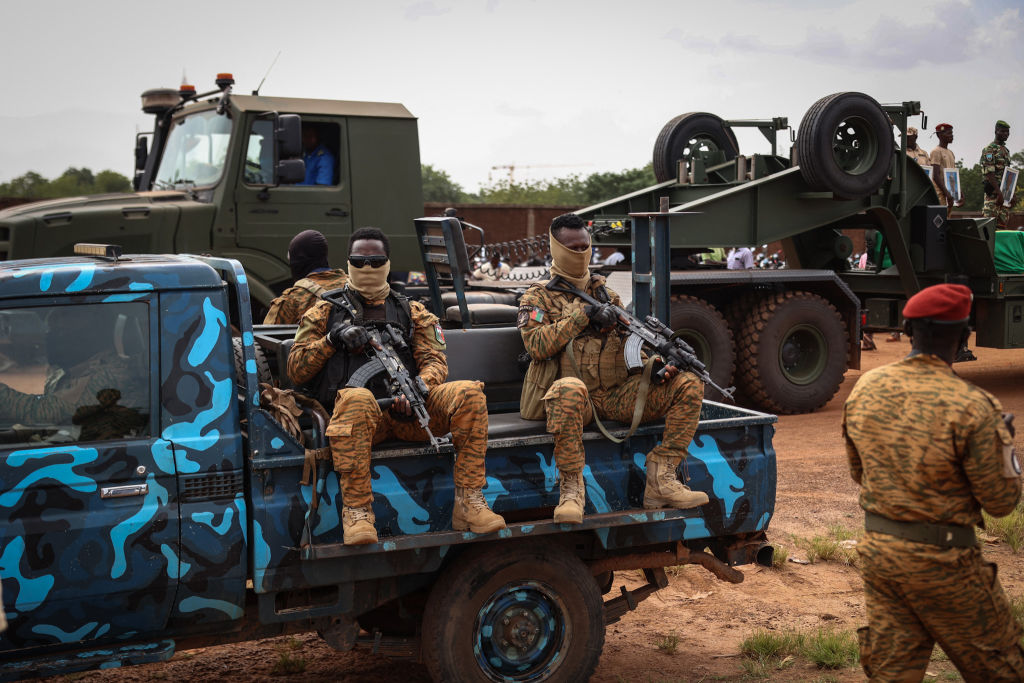Militant Islamist violence in Burkina Faso, Mali and Niger is continuing to expand to the west and south, threatening coastal nations from Mauritania to Nigeria.
Violence linked to terror groups affiliated with al-Qaida and the Islamic State group (IS) has steadily increased in scale and scope in recent years. Fatalities linked to these groups are more than two and a half times the levels recorded in 2020 when the first of Mali’s military coups occurred, the Africa Center for Strategic Studies (ACSS) reported. Increased insecurity also came after subsequent coups in Burkina Faso and Niger.
“The continued southward and westward push of militant Islamist groups is heightening the pressure on the borders of all the coastal West African countries,” the ACSS reported. “This will require the redoubling of proactive security and governance outreach measures in the northern regions of these countries to mitigate this threat and hold the line.”
Fatalities linked to militant Islamist group violence within 50 kilometers of or beyond the borders of coastal West Africa increased from 1,601 to 2,036 between 2023 and 2024, according to the ACSS. The biggest increase was in Mali, where fatalities linked to militant Islamist groups within 50 kilometers of its borders with Guinea, Mauritania and Senegal jumped from 23 in 2023 to 125 last year.
In coastal West Africa, most of the violence is in Benin and Togo, which recorded 153 and 96 fatalities linked to militant Islamist groups, respectively, in 2024. It has continued to spread this year.
In mid-April, the al-Qaida-affiliated Jama’at Nusrat al-Islam wal-Muslimin (JNIM) claimed responsibility for an attack that killed 54 Beninese Soldiers near the country’s borders with Burkina Faso and Niger. This marked the deadliest known terror attack since insurgents began operating in northern Benin several years ago.
Wilfried Leandre Houngbedji, a Beninese government spokesperson, said the country was determined to fight off the jihadists. “We won’t give in … I can assure you that sooner or later, sooner or later, we will win,” Houngbedji said in a BBC report.
In southwestern Burkina Faso, groups linked to JNIM continued to threaten northern Côte d’Ivoire, where fatalities linked to the groups rose from 267 in 2023 to 361 in 2024.
JNIM and its offshoot, the Maçina Liberation Front (FLM), have established a stronghold in central Mali. From there, the FLM has expanded deeper into southern Mali and Burkina Faso. According to Reuters, terrorists fighting in Burkina Faso also are using the southern border area with Ghana as a logistical and medical base.
Other JNIM contingents, such as Ansaroul Islam and Katiba Hanifa, have sustained their activities in northern and eastern Burkina Faso and expanded farther south into the border areas of Togo and Benin.
Katiba Hanifa is established in southeastern Burkina Faso, where it uses safe havens in the W-Arly-Pendjari (WAP)reserve to infiltrate Benin and Togo while expanding farther west in Burkina Faso along the borders with Ghana and Togo, the ACSS reported. Last year, the group threatened trade as it targeted road networks and key border crossings, such as Gaya in Niger. If the group successfully expands across southern Burkina Faso, Ouagadougou, the national capital, would be surrounded
Fatalities linked to militant Islamist groups in Burkina Faso’s Est Region — including the WAP complex and the borders with Benin, Niger and Togo — nearly tripled over the past two years to 1,472 deaths, according to the ACSS. In the Centre-Est Region bordering Ghana and Togo, fatalities linked to militant Islamist groups increased 266% to 612 deaths during the same time period.
From its stronghold in Mali’s northern Ménaka region, the Islamic State in the Greater Sahara (ISGS) has increased its violent attacks in western Niger, where fatalities due to militant Islamist violence jumped 66% to 1,318 deaths in the past year, the ACSS reported. The ISGS has maintained pressure in northern Mali and northern Burkina Faso, where it occasionally battles JNIM.
Dozens of violent extremist attacks also have been reported in southern Mali within 50 kilometers of the borders of Guinea, Mauritania and Senegal. Until recently, these areas had reported little or no terrorism.

